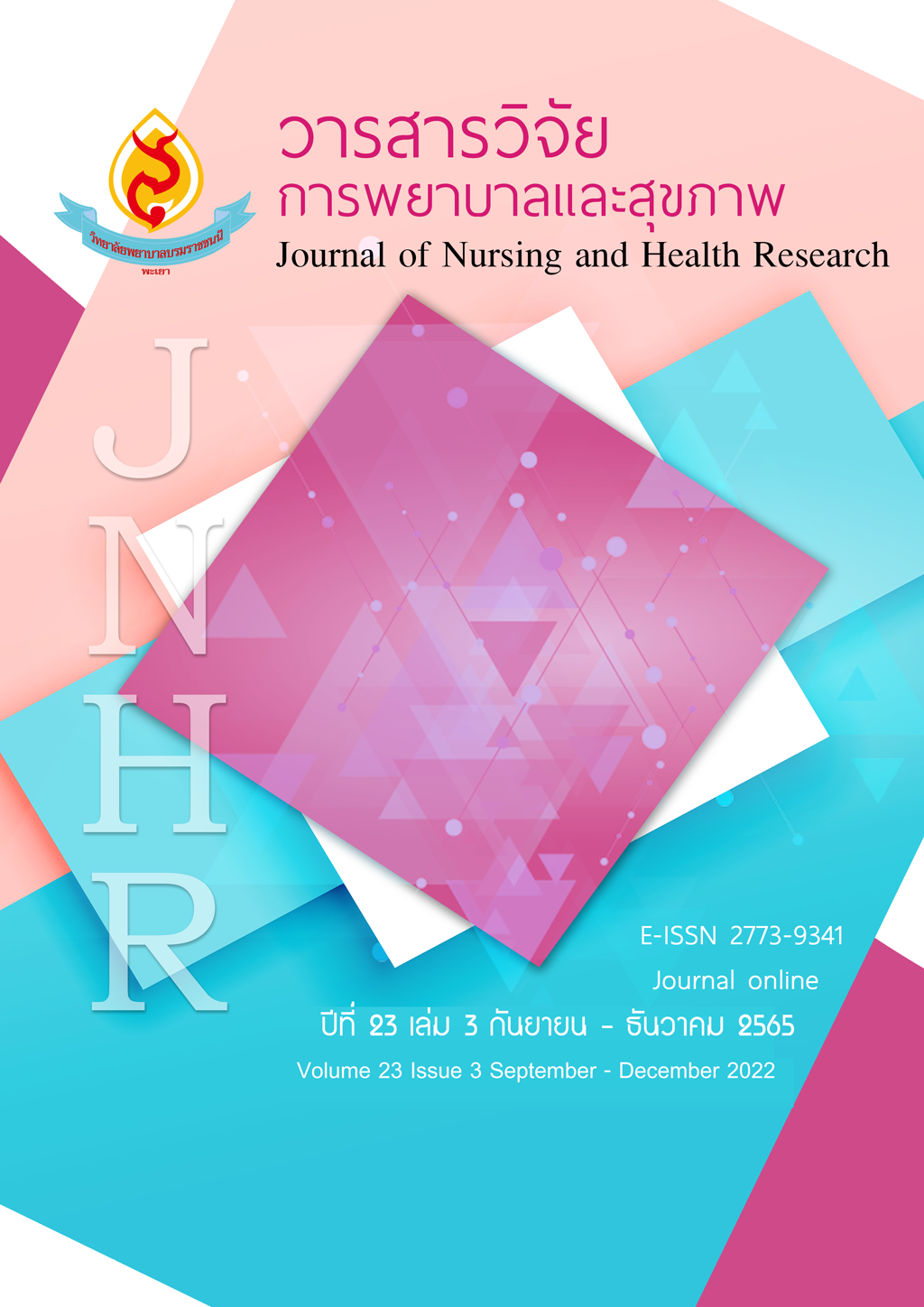ผลของโปรแกรมเสริมพลังอำนาจต่อพฤติกรรมการบริโภคอาหารและการออกกำลังกาย การรับรู้พลังอำนาจ และภาวะสุขภาพของประชาชนกลุ่มเสี่ยงต่อภาวะเมตาบอลิกซินโดรม
คำสำคัญ:
โปรแกรมเสริมพลังอำนาจ , การรับรู้พลังอำนาจ, พฤติกรรมการบริโภคอาหารและการออกกำลังกาย, กลุ่มเสี่ยงภาวะเมตาบอลิกซินโดรมบทคัดย่อ
ภาวะเมตาบอลิกซินโดรมเป็นผลมาจากพฤติกรรมการรับประทานอาหารและการออกกำลังกายที่ไม่เหมาะสมส่งผลให้เจ็บป่วยด้วยโรคไม่ติดต่อเรื้อรังที่สำคัญ โดยเฉพาะโรคความดันโลหิตสูง โรคไขมันในเลือดสูง โรคเบาหวาน และโรคหัวใจและหลอดเลือด งานวิจัยนี้มีวัตถุประสงค์เพื่อศึกษาผลของโปรแกรมเสริมพลังอำนาจต่อพฤติกรรมการบริโภคอาหารและการออกกำลังกาย การรับรู้พลังอำนาจของตนเองและภาวะสุขภาพ เป็นการวิจัยกึ่งทดลองแบบกลุ่มเดียววัดผลก่อนและหลังการทดลอง กลุ่มตัวอย่างเป็นผู้ที่มีความเสี่ยงต่อการเกิดภาวะเมตาบอลิกซินโดรมจำนวน 30 คนโดยเลือกแบบเจาะจงและยินดีเข้าร่วมโปรแกรม 8 สัปดาห์ เครื่องมือที่ใช้ในการวิจัย ประกอบด้วยแบบประเมินภาวะสุขภาพ โปรแกรมเสริมพลังอำนาจเป็นระยะเวลา 8 สัปดาห์และแบบสอบถาม 3 ด้านคือ 1) ข้อมูลส่วนบุคคล 2) พฤติกรรมการบริโภคอาหารและการออกกำลังกาย และ 3) การรับรู้พลังอำนาจ วิเคราะห์ข้อมูลด้วยสถิติพรรณนาและ paired sample t-test ผลการศึกษา พบว่า หลังได้รับโปรแกรมเสริมพลังอำนาจ กลุ่มตัวอย่างมีคะแนนเฉลี่ยพฤติกรรมการบริโภคอาหารและการออกกำลังกาย และคะแนนเฉลี่ยการรับรู้พลังอำนาจต่อการป้องกันภาวะเมตาบอลิกซินโดรมสูงขึ้น อย่างมีนัยสำคัญทางสถิติ (p<.05) นอกจากนี้ค่าเฉลี่ยของเส้นรอบเอวและน้ำหนักตัวลดลงอย่างมีนัยสำคัญทางสถิติ (p<.05) โปรแกรมเสริมพลังอำนาจสามารถส่งเสริมและสนับสนุนให้เกิดการเปลี่ยนแปลงพฤติกรรมสุขภาพด้านการบริโภคอาหารและการออกกำลังกาย ช่วยลดปัจจัยเสี่ยงต่อการเกิดโรคไม่ติดต่อเรื้อรังได้
เอกสารอ้างอิง
กรมอนามัย กระทรวงสาธารณสุข. (2560). แผนแม่บทการส่งเสริมกิจกรรมทางกาย (พ.ศ. 2561-2573). สืบค้นเมื่อ 28 พฤศจิกายน 2563, จาก https://dopah.anamai.moph.go.th/th/activity-plan/185662.
ชมนาด วรรณพรศิริ และนิยม เล็กชูผล. (2559). ผลโปรแกรมการสร้างพลังอำนาจพฤติกรรมการป้องกันภาวะเมตาโบลิค ดัชนีมวลกาย รอบเอว และความดันโลหิตของผู้ใหญ่ไทยในชนบท. วารสารการพยาบาลและการศึกษา, 9(4), 29-41.
น้ำทิพย์ ยิ่มแย้ม และยุวดี รอดจากภัย. (2560). ผลของโปรแกรมการเสริมสร้างพลังอำนาจผู้ดูแลในการดูแลผู้สูงอายุกลุ่มเสี่ยงโรคความดันโลหิตสูง ตำบลแก่งดินสอ อำเภอนาดีจังหวัดปราจีนบุรี. วารสารสำนักงานป้องกันควบคุมโรคที่ 7 ขอนแก่น, 24(2), 46-58.
วรดา ทองสุก, วรวรรณ์ ทิพย์วารีรมย์ และปิ่นหทัย สุภเมธาพร. (2563). ผลของโปรแกรมการเสริมสร้างพลังอำนาจต่อพฤติกรรมสุขภาพ ดัชนีมวลกายและระดับความดันโลหิตในผู้ป่วยโรคความดันโลหิตสูงที่ควบคุมไม่ได้. พยาบาลสาร, 47(4), 229-241.
วิยะการ แสงหัวช้าง, วิไลวรรณ แสงธรรม และวิไลวรรณ วงศ์เจริญ. (2560). ผลของการใช้โปรแกรมการเสริมสร้างพลังอำนาจต่อการรับรู้พลังอำนาจและพฤติกรรมการป้องกันโรคหลอดเลือดสมองในผู้สูงอายุโรคเรื้อรัง. วารสารวิชาการมหาวิทยาลัยอีสเทิร์นเอเชีย ฉบับวิทยาศาสตร์และเทคโนโลยี, 11(3), 159-172.
วิภา เพ็งเสงี่ยม, พัชราภรณ์ ไชยสังข์, วาสนา พงษ์สุภษะ, และศิริรัตน์ จูมนะนะ. (2561). การพัฒนาโปรแกรมสร้างเสริมพลังอำนาจของผู้ดูแลผู้สูงอายุติดเตียงในชุมชน. การพยาบาลและการศึกษา, 18(3), 83-95.
สำนักงานสาธารณสุขจังหวัดปทุมธานี. (2560). รายงานระบบข้อมูลโรคติดต่อไม่เรื้อรัง จังหวัดปทุมธานี. สืบค้นเมื่อ 20 มีนาคม 2561, จาก http://203.157.108.3/chronic60/report_main.php.
อรรถเกียรติ กาญจนพิบูลวงศ์, ภาณุวัฒน์ คำวังสง่า, และสุธิดา แก้วทา. (บ.ก.). (2562). รายงานสถานการณ์โรค NCDs เบาหวาน ความดันโลหิตสูงและปัจจัยเสี่ยงที่เกี่ยวข้อง พ.ศ. 2562. กรมควบคุมโรค กระทรวงสาธารณสุข: อักษรกราฟฟิคแอนด์ดีไซน์
Chait, A., & Den Hartigh, L. J. (2020). Adipose tissue distribution, inflammation and its metabolic consequences, including diabetes and cardiovascular disease. Frontiers in Cardiovascular Medicine, 7. https://doi.org/10.3389/fcvm.2020.00022
Cohen. (1992). Statistical power analysis of the behavioral sciences. New York: Lawrence Erlbaum Associates.
Ebrahimi, H., Sadeghi, M., Amanpour, F., & Vahedi, H. (2016). Evaluation of empowerment model on indicators of metabolic control in patients with type 2 diabetes, a randomized clinical trial study. Primary Care Diabetes, 10(2), 129–135. https://doi.org/10.1016/j.pcd.2015.09.003
Gibson, C. H. (1995). The process of empowerment in mothers of chronically ill children. Journal of advanced nursing, 21(6), 1201-1210.
Gray, J. R., Grove, S. K., & Burns, N. (2013). The practice of nursing research e-book: appraisal, synthesis, and generation of evidence (7th ed). Missouri: Elsevier Health Sciences.
McCracken, E., Monaghan, M., & Sreenivasan, S. (2018). Pathophysiology of the metabolic syndrome. Clinics in Dermatology, 36(1), 14-20.
Muscogiuri, G., Barrea, L., Di Somma, C., Altieri, B., Vecchiarini, M., Orio, F., ... & Savastano, S. (2019). Patient empowerment and the mediterranean diet as a possible tool to tackle prediabetes associated with overweight or obesity: a pilot study. Hormones, 18(1), 75-84.
Rojas, E., Castro, A., Manzano, A., Suarez, M., Lameda, V., Carrasquero, R., . . . Bermudez, V. (2020). Diagnostic criteria and management of metabolic syndrome: evolution overtime. Gaceta Médica De Caracas, 128(4), 480-504. doi: 10.47307/GMC.2020.128.4.5
Zhu, L., Spence, C., Yang, W. J., & Ma, G. X. (2020). The IDF definition Is better suited for screening metabolic syndrome and estimating risks of diabetes in asian american adults: evidence from NHANES 2011–2016. Journal of Clinical Medicine, 9(12). doi:10.3390/jcm9123871
ดาวน์โหลด
เผยแพร่แล้ว
รูปแบบการอ้างอิง
ฉบับ
ประเภทบทความ
สัญญาอนุญาต
ลิขสิทธิ์ (c) 2022 วารสารวิจัยการพยาบาลและสุขภาพ

อนุญาตภายใต้เงื่อนไข Creative Commons Attribution-NonCommercial-NoDerivatives 4.0 International License.



